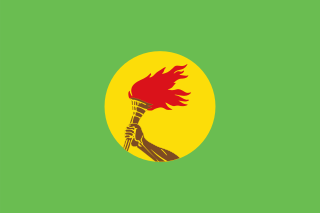
Zaire, officially the Republic of Zaire, was a Congolese state from 1971 to 1997 in Central Africa that was previously and is now again known as the Democratic Republic of the Congo. Zaire was, by area, the second-largest country in Africa, and the 11th-largest country in the world. With a population of over 23 million inhabitants, Zaire was the most populous officially Francophone country in Africa, as well as one of the most populous in Africa.

Mobutu Sese Seko Kuku Ngbendu wa za Banga, commonly known as Mobutu Sese Seko or just Mobutu, was a Congolese politician and military officer who was the president of Zaire from 1965 to 1997. He also served as Chairman of the Organisation of African Unity from 1967 to 1968. During the Congo Crisis, Mobutu, serving as Chief of Staff of the Army and supported by Belgium and the United States, deposed the democratically elected government of left-wing nationalist Patrice Lumumba in 1960. Mobutu installed a government that arranged for Lumumba's execution in 1961, and continued to lead the country's armed forces until he took power directly in a second coup in 1965.

Léon Kengo wa Dondo is a Congolese politician who served as the "first state commissioner" several times under Mobutu Sese Seko in Zaïre. He was one of the most powerful figures in the regime and was a strong advocate of economic globalization and free-market economics. He served as President of the Senate of the Democratic Republic of the Congo from 2007 to 2019.
Regular elections in Croatia are mandated by the Constitution and legislation enacted by Parliament. The presidency, Parliament, county prefects and assemblies, city and town mayors, and city and municipal councils are all elective offices. Since 1990, seven presidential elections have been held. During the same period, ten parliamentary elections were also held. In addition, there were nine nationwide local elections. Croatia has also held three elections to elect members of the European Parliament following its accession to the EU on 1 July 2013.
Frederick Walter Scott Craig was a Scottish psephologist and compiler of the standard reference books covering United Kingdom Parliamentary election results. He originally worked in public relations, compiling election results in his spare time which were published by the Scottish Unionist Party. In the late 1960s he launched his own business as a publisher of reference books, and also compiled various other statistics concerning British politics.

Elections in North Korea are held every four-to-five years for the Supreme People's Assembly (SPA), the country's national legislature, and every four years for Local People's Assemblies.
In various parliamentary systems, a returning officer is responsible for overseeing elections in one or more constituencies.

The Popular Movement of the Revolution was the ruling political party in Zaire. For most of its existence, it was the only legally permitted party in the country. It was founded by Joseph-Désiré Mobutu on 20 May 1967.

Presidential elections were held in the Democratic Republic of the Congo on 1 November 1970. The only candidate was Joseph Mobutu, who had taken power in a military coup five years earlier. The elections took the format of a "yes" or "no" vote for Mobutu's candidacy. According to official figures, Mobutu was confirmed in office with near-unanimous support, with only 157 "no" votes out of over 10.1 million total votes cast. Mobutu also received around 30,000 more "yes" votes than the number of registered voters, even though voting was not compulsory.

Parliamentary elections were held in the Democratic Republic of the Congo on 15 November 1970. They were the first parliamentary elections held since Joseph Mobutu seized power in a coup five years earlier.

Parliamentary elections were held in Zaire on 2 November 1975. At the time, the country was a one-party state with the Popular Movement of the Revolution (MPR) as the only legally permitted party. Voters approved a single list of 244 MPR candidates. Instead of the "costly and complicated" system of casting ballots, the election took place by "acclaim"; candidates were presented at public locations such as stadiums and the audience approved them by cheering.

Parliamentary elections were held in Zaire on 15 and 16 October 1977, having originally been scheduled for 1980. The Popular Movement of the Revolution (MPR) was the sole legal party at the time, with all candidates standing for election to the Legislative Council belonging to it. In total, 2,074 candidates ran for the 289 seats. Voter turnout was 92.8%.

Parliamentary elections were held in Zaire on 6 September 1987. The Popular Movement of the Revolution was the sole political party at the time, with all candidates running for election to the Legislative Council required to be party members. In total, 1,075 candidates ran for the 210 seats.
Gate Mudaliyar Mohammed Samsudeen Kariapper was a Sri Lankan politician. He was the Parliamentary Secretary to the Minister of Justice and Member of Parliament for Kalmunai.
Lakshman Rajapaksa was a Sri Lankan politician.

Christian Malanga Musumari, commonly known as Christian Malanga is a Congolese politician, businessman, and former military officer. He is currently President of the United Congolese Party (UCP), a national political party he formed after his experiences in the Democratic Republic of the Congo's widely disputed parliamentary elections in 2011. In 2013, he was appointed the first ambassador of the International Religious Freedom Roundtable. On May 17, 2017, the New Zaire was officially born when President Malanga created a government in exile in Brussels.
Mohamed Ehuttar Hadjiar Mohamed Ali was a Ceylonese politician and Member of Parliament.
Don Frank Hettiarachchi was a Ceylonese politician.








